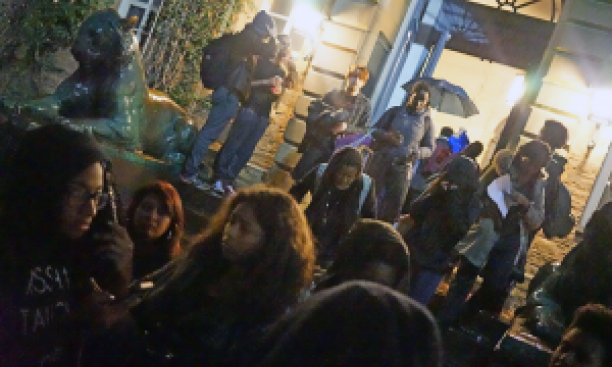

In the wake of the two-day sit-in at Nassau Hall last week by members of the Black Justice League, students, faculty, and alumni have publicly taken positions both for and against the group’s demands related to Princeton’s racial climate. At the same time, a group of Latino students has released a petition and report calling for greater support for and representation of the Latino community on campus.
Nearly 100 faculty members have signed a letterdrafted by African American studies department faculty in support of the Black Justice League, urging campus-wide reflection on the issues brought to light. A student petition to counter the group’s demands has more than 1,300 signatures since Josh Zuckerman ’16 and Evan Draim ’16 launched it Thursday, while a similar alumni petition started by Darren Geist ’05 has 44 signatures.
A newly formed student group, Princeton Open Campus Coalition, also wrote an open letter Sunday to President Eisgruber ’83 opposing the Black Justice League’s tactics and requesting a more open campus discussion. “We are concerned mainly with the importance of preserving an intellectual culture in which all members of the Princeton community feel free to engage in civil discussion and to express their convictions without fear of being subjected to intimidation or abuse,” the letter reads.
Another petition has gained 540 signatures supporting the report “Latinx Students Calling for a Better Princeton,” which asks for greater campus representation academically and culturally (the group uses the non-gendered term Latinx to be “inclusive and supportive of all members of our community”). The report notes that only 2 percent of full professors are Hispanic and finds a lack of cultural space and institutional support for Latino students. It requests that the University support and improve the experience of undocumented Princeton students.
In an email sent Sunday to students, alumni, and other members of the Princeton community over the weekend, Eisgruber acknowledged the concerns of underrepresented students, citing actions taken by both the Black Justice League and the Latinx community. He described upcoming initiatives to address these concerns, including the formation of a subcommittee of the trustees to re-examine Woodrow Wilson 1879’s legacy and his place on Princeton’s campus. Eisgruber stressed that the issues would be considered “through appropriate University processes – processes that allow for full and fair input from the entire University community.”
“Our students deserve better, and Princeton must do better,” he wrote. “We must commit ourselves to make this University a place where students from all backgrounds feel respected and valued,” adding that hard work and good will are necessary to achieve further progress toward a diverse and inclusive community.
Here’s what others have been writing about Woodrow Wilson 1879 and the controversy surrounding his legacy:
- Christine Emba ’10, The Washington Post, Nov. 22
- Andy Newman ’86, The New York Times, Nov. 22
- Josh Marshall ’91, Talking Points Memo, June 26 (published before recent protests)
- Corey Robin ’89, Salon, Nov. 20
- Jonathan Zimmerman, Politico, Nov. 23
- Bill Scher, RealClear Politics, Nov. 23
- Gordon J. Davis, The New York Times, Nov. 24
UPDATE Additional coverage related to Wilson’s legacy:
Editorial, The New York Times: The Case Against Woodrow Wilson at Princeton, Nov. 25
